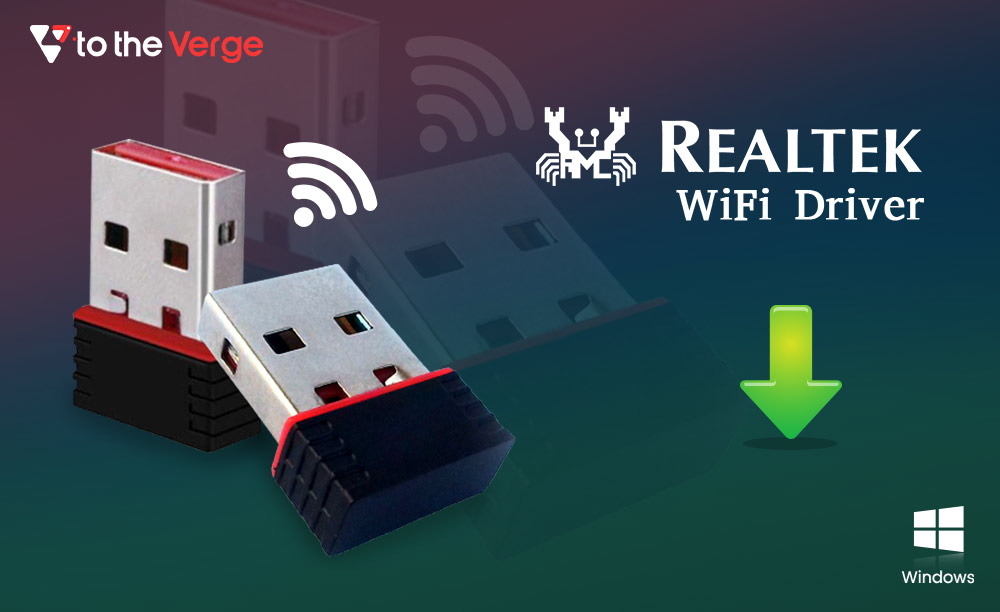If the user interface, pricing, or any other aspect of GitHub fails to meet your needs, consider exploring the best GitHub alternatives that you can use in 2023.
As software development has become increasingly popular, the need for platforms to host code repositories and enable collaboration between developers has become more important than ever. Furthermore, if you work as a software developer, you are probably already familiar with GitHub. It is a platform that enables you to coordinate, share, and handle tasks with other programmers.
GitHub is a powerful collaborative web-based platform that employs Git, an open-source version control tool. GitHub is a code hosting platform that enables developers to work on multiple projects at the same time. This outstanding version control tool has many advantages, including accurate bug tracking, real-time collaboration, and excellent documentation. It also enables users to host single web pages using GitHub pages at no cost.
While GitHub has long been the go-to platform for many developers, there are now several alternatives that offer similar or even better features. In this article, we will take a closer look at the 7 best GitHub alternatives available in 2023. So without further ado, let’s move ahead.
7 Best GitHub Alternatives in 2023
Despite being regarded as the best tool for developers to share code, GitHub has some drawbacks. As a result, here are the 7 best collaborative Git platforms that every developer should use as an alternative to GitHub.
1. GitLab
GitLab is a popular choice when looking for a free alternative to GitHub because it has many of the same features. Even if you are switching for the first time from GitHub to GitLab, you will find that the user interfaces are quite similar and are both very simple to use.
GitLab provides a free community in which users can collaborate, store, and share their code. It is one of the best GitHub alternatives that offers a variety of features and is an open-source platform. GitLab is free, but it does have paid features that are comparable to GitHub.

Key Features:
- Authentication and authorization via flexible permissions, secured tags, and server access.
- SAML SSO for groups, LDAP group sync filters, and multiple LDAP support are all available in this open-source GitHub alternative.
- Value stream management, smart card support, and IP whistling are all used for authentication.
- With an advanced time-tracking feature, you can drag and drop your tasks and keep track of descriptions and comment changes.
- The management of backlogs, risks, portfolios, teams, and workflows, among other things.
2. Bitbucket
Bitbucket is another popular alternative to GitHub that offers a complete code collaboration platform. It belongs to Atlassian, a company that also owns Trello and Jira. Bitbucket integrates with many other Atlassian tools and provides limitless private repositories at no cost.
While Bitbucket’s user interface differs slightly from GitHub’s, it offers the same functionality, including pull requests, code reviews, and issue tracking. The API is one of the features that you will be able to use on Bitbucket. This platform enables Bitbucket developers to integrate other tools and services. Additionally, this free GitHub alternative offers both self-hosted and cloud-based options.
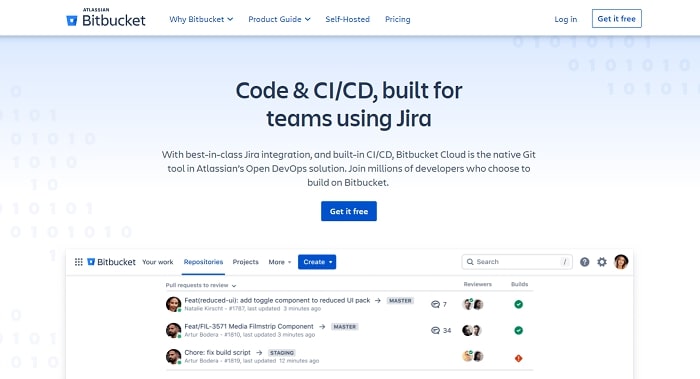
Key Features:
- Submit pull requests for higher quality code and distribute it among your team members.
- Branch permission for access control and code-aware search to speed up searches.
- Use Git LFS (Large File Storage) to store large files and rich media.
- You can plan your projects and communicate with team members using Trello boards.
- Diff views, build integration, third-party integrations, and desktop clients.
- Flexible execution and deployment options.
Read Also: Best Evernote Alternatives And Competitors in 2023
3. SourceForge
SourceForge is one of the oldest and most popular GitHub alternatives. This platform is solely for software developers. On this platform, you can host your software for download by others, as well as provide reviews, share codes, and work with other developers worldwide.
It is among the websites for developers with the highest activity. SourceForge is a fantastic alternative to GitHub, even though it may not appear as modern. Developers can access this open-source GitHub alternative for free.
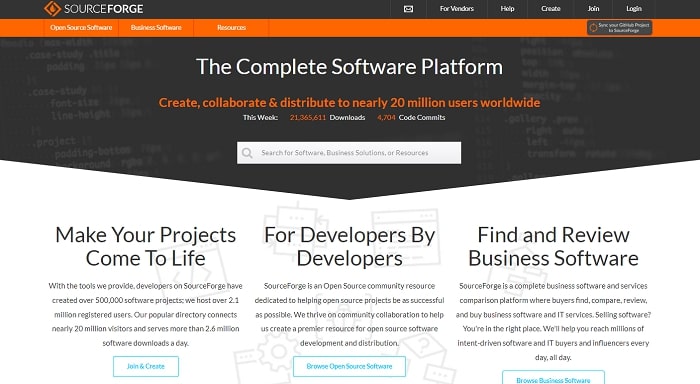
Key Features
- Use filters such as location, platform, region, and so on to download analytics for your projects at any time.
- It functions as an unrestricted global mirror network for open-source projects.
- You can create videos, take screenshots, organize projects into categories, and share your work on social media thanks to open-source directories.
- You can host code in open-source repositories using Git, Mercurial, or any other subversion.
- This free GitHub alternative runs on Apache Allura, which allows you to host your forge and make improvements to it.
4. Launchpad
Another long-standing platform that functions similarly to GitHub is called Launchpad. The majority of developers use Launchpad as a platform for collaboration and idea sharing. Launchpad is an open-source platform where developers, like SourceForge, can always host and maintain their software.
With the help of this open-source GitHub alternative, you can track bugs and other problems as well as share source codes. Although it may not be as well-known as GitHub, this platform is among the best GitHub alternatives.
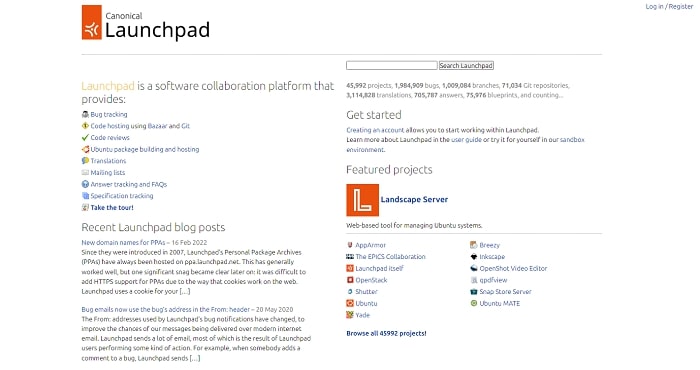
Key Features
- Keeping track of bugs, hosting code on Bazaar, conducting code reviews, and translating code.
- Open stack dashboard, Ubuntu package, and designate dashboard.
- a platform for teamwork using free and open-source software.
- Share bug reports, sign up for email alerts, and make drive-by contributions.
- Make connections between bugs, branches, and team branches.
Read Also: Best TeamViewer Alternatives For Remote Desktop Access in 2023
5. GitKraken
GitKraken is a robust Git client with a visual interface for managing Git repositories. It supports various Git hosting services, including GitHub, GitLab, and Bitbucket. GitKraken includes a number of useful features, including code review, merge conflict resolution, and built-in Git commands.
The interface of this free GitHub alternative is simple to use and offers a variety of customization options. It also integrates with well-known tools like Jira and Trello. GitKraken offers both a free version for personal use and a paid version with more features and support.

Key Features
- Visual commit history, fuzzy finder, drag and drop, and one-click undo/redo are all features of the intuitive UI/UX.
- Editor for merge conflicts, which includes an output editor and a merge tool within the app.
- An integrated code editor with a file mini-map, syntax highlighting, and a diff split view is available in this open-source GitHub alternative.
- Task tracking using GitHub Issue Sync, Markdown support, and a calendar view by linking a Glo board to a Git Kraken repository.
- There are also additional features like support for Git flow, Git LFS, Git hooks, interactive rebase, keyboard shortcuts, light and dark themes, etc.
6. Gitea
Gitea is a self-hosted code versioning program made with the needs of both individuals and small businesses in mind. With this hassle-free and user-friendly code versioning tool, businesses can meet their daily needs with the simplest installation procedure around. All of the major operating systems, including Windows, Linux, and macOS, are supported by this GitHub alternative, which was entirely written in Go.
Gitea is so portable and handy that it can be successfully run on a $5 Raspberry Pi. Gitea integrates completely with Docker and Vagrant. It enables you to securely develop high-quality software in containers and a virtual environment, giving companies that use Docker an advantage.
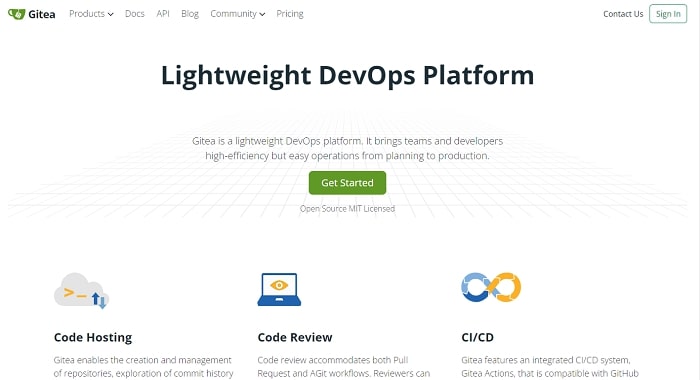
Key Features
- Open-source with assistance for several operating systems, databases, and markdown.
- Low CPU/RAM usage with simple upgrade procedures.
- Support for CSV files, Git wikis, third-party integration, deploy tokens, and repository tokens are available in this open-source GitHub alternative.
- Global code search, branch creation, web code editor, and commit-graph are all available.
- Requests for pull/merge, squash/rebase merging, pull/merge templates, etc.
Read Also: Best Flash Player Alternatives [Latest 2023]
7. Git Bucket
Git Bucket is a Scala-based Github alternative that is simple to install. It is a JVM-based open-source Git platform. It is designed as a GitHub clone to offer developers a free open-source environment with high extensibility, simple installation, and GitHub API compatibility.
Additionally, Git Bucket is accessible as an open-source program under the Apache License Version 2.0. Additionally, this free GitHub alternative offers features similar to those of GitHub. Which includes hosting Git repositories over HTTP and SSH, a user interface, issues, wikis, pull requests, etc.
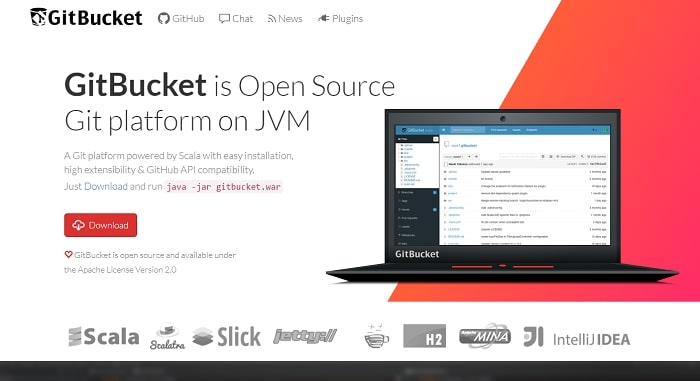
Key Features
- It uses Scala and is self-hosted, open-source, cross-platform, and free.
- Easy setup, SSH keys, and a fantastic user interface like GitHub.
- Git repositories that are both public and private, with a repository viewer and online file editing.
- Repository search, mail alerts, issues, and user administration.
- Wikis, requests for fork pulls, activity timelines, LDAP integration, gravatar support, etc.
Key Takeaway
For programmers who want to keep up with their projects while on the go, there are many GitHub alternatives available. All of the apps we have discussed in this article offer various features and functionalities that can assist you in effectively managing your projects. There is an app for everything, from exploring repositories to handling problems and making changes to your code through pull requests.
By utilizing one of these apps, you can guarantee that your workflow is uninterrupted. And that you are able to continue being productive even when you are not using your computer. So, which of these GitHub alternatives will suit your needs the best? Please share your thoughts in the comments section below.
Snehil Masih is a professional technical writer. He is passionate about new & emerging technology and he keeps abreast with the latest technology trends. When not writing, Snehil is likely to be found listening to music, painting, traveling, or simply excavating into his favourite cuisines.

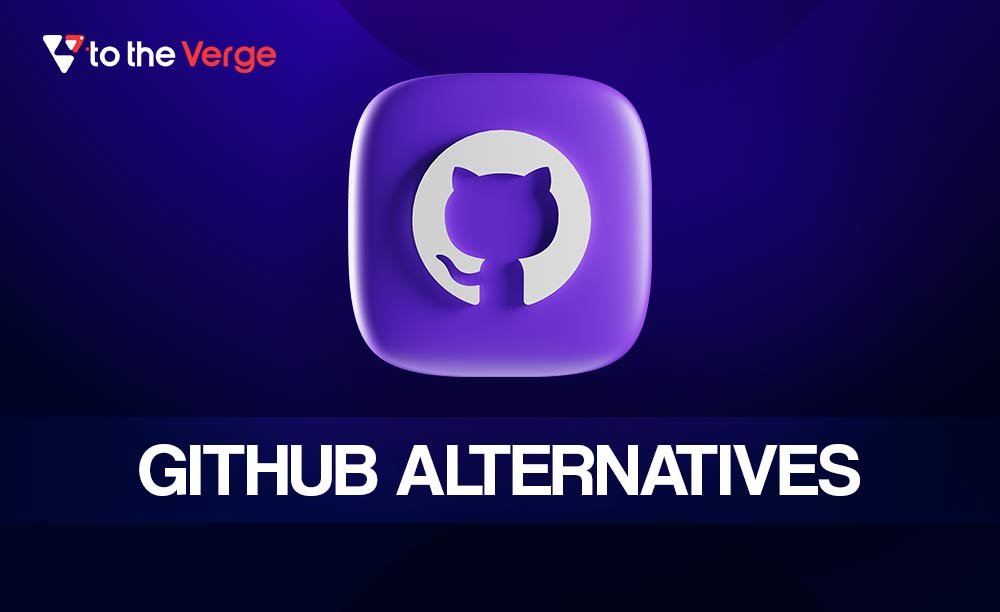





![How to Update and Reinstall Keyboard Drivers on Windows 10/11 [A Guide]](https://wpcontent.totheverge.com/totheverge/wp-content/uploads/2023/06/05062841/How-to-Update-and-Re-install-Keyyboard-Drivers-on-Windows-10.jpg)
